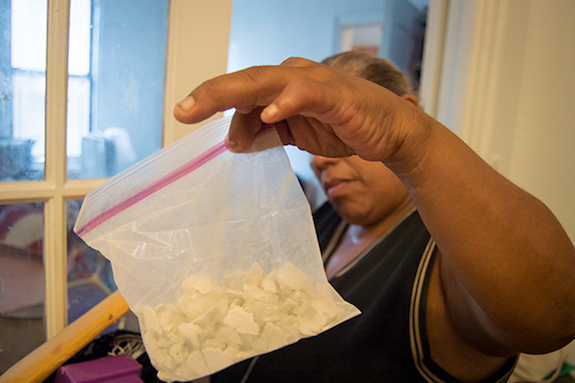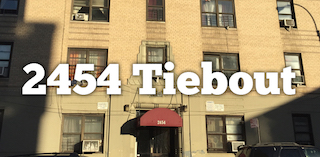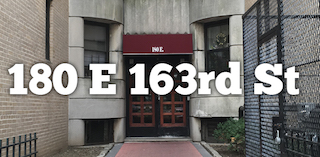835 Walton Avenue
by Rebecca Schuetz and Ruinan Zhang
The Bronx Ink has profiled buildings owned by Ved Parkash, who was until recently rated the worst landlord in New York by the Public Advocate’s office. The profiles form part of a wider investigation into housing conditions and tenant harassment in the Bronx. Find other buildings using the panel to the right.

Tenant Denise Baez held up a bag of paint chips from her apartment containing lead.
Vashti DeSaussure has lived on 835 Walton Avenue for over half of her 75 years.
She has come to view many other families in the 60-unit building as extensions of her own—people she takes out for lunch and sends her kids, two of whom live in the same building, to check up on.
But DeSaussure said that even 42 years’ worth of memories and proximity to friends and family would not be enough to tie her to the apartment if she had the means to leave. “If I hit the lottery, I’ll surely be out of here,” she said.
Ever since Ved Parkash bought the landmark building 14 years ago with a $2.4 million mortgage, the building has been slapped with 63 violations and 45 complaints with the Department of Buildings.
Only one of the violations was resolved in less than a year; on average, complaints take almost four years to close.

Water leaked in the basement, where rats and flies were drawn to the garbage.
This means many residents have had to go to great lengths to keep their apartments habitable—reporting violations to 311, putting thousands of their own dollars into repairs and renovations, and even withholding rent in order to argue their cases in court.
Eighteen violations are for the elevator, which emits a persistent whine punctuated by banging as people get stuck between floors. This means DeSaussure, who has severe arthritis, spends much of her retirement inside her fifth-floor apartment.
“I didn’t go down at all yesterday,” she said. “Friday, I went down because I had to go to a funeral. And I almost cried every step because my leg started hurting.”
The building is maintained by a father-son team of off-site supers, Moises and Jose Cabrera, and a porter, Jerome Outlaw. Outlaw described working long days and weekends. “The building is fine, we are putting the building back into order,” he said. Moises Cabrera, who has maintained the building for two years, explained that repairs are delayed because Parkash must sign off before he can begin, which can take some time unless the work order has been triggered by a 311 complaint.
Tenants have seen this in practice. Danilda Ramirez, a floor below DeSaussure, emailed the landlord seven times about a leak in her bathroom before she finally called 311. The next day, the super showed up with tools to repair it.

Damon Flowers posed in his apartment, which he renovated himself. He said when he moved in, the floors were linoleum and the kitchen smelled like gas.
Damon Flowers, who works for NBC Universal’s corporate office, moved in three years ago. His apartment features chandeliers with dimmable lighting, purple walls with golden Grecian trim, and a wine fridge. The $1667 a month he pays for a two-bedroom apartment struck Flowers as a good deal in a neighborhood with rising rents.
“I thought that apartment had good bones,” he said. “But the floor was terrible.” He said the agent promised the floors would be replaced with hardwood before he moved in. But that promise never materialized.
He ended up renovating them himself for over $2,500.
Flowers found communication with Parkash difficult for even his basic needs. He said when a leak sprang and Parkash did not answer his calls, he resorted to withholding his rent so he could make his case before a judge. Only then were the repairs finally made. Parkash declined to comment on this allegation.
Even Denise Baez, who said she’s known Parkash for 26 years, has had to turn to the courts for maintenance. Baez was the building’s manager before Parkash bought it in 2002, and after the transition she noticed changes. The lobby security cameras fell into disuse, and when the live-in super retired, an off-premises super was contracted. When she called the office she had difficulties getting through. “I call every day for the elevator. Literally every day,” she said.
After Parkash failed to remove the lead paint in her apartment despite receiving a violation, Baez finally turned to Bronx Legal Services. “Lead is certainly one of those conditions we find to be one of the most serious,” said Fernando Manzo, Baez’s legal aide. He brought the lead, roaches, mice, leaks, holes in the floors, and missing tiles and electrical sockets to a judge’s attention. The judge reduced Baez’s rent through this June, at which point the problems were expected to be resolved. “But it’s hard for them to enforce,” said Manzo. According to Baez, the paint has yet to be completely removed.
Again, Parkash declined to comment.

Baez’s holiday decorations were stored in a cupboard, one of the places where she said lead paint has yet to be removed.
Baez still has a plastic bag of paint chips tested for lead and the tote bag of documents she brought to court. She pulled them out in her hallway, cluttered with bags of belongings she’s attempting to protect from lead and rats as her walls are torn down to remove paint. Her fears are that the delayed repairs may have already had irreparable consequences.
Her niece, who has grown up in the apartment, has been having issues in school. “We don’t know if it’s the lead paint or if it’s ADHD, which could’ve been caused by being in here since she was born,” she said. She put the paint chips back in her back and shook her head. “I’m taking him back to court.”





 Christiana Barkley and Yuxiao Gao
Christiana Barkley and Yuxiao Gao Corinna Burford and Taylor Hess
Corinna Burford and Taylor Hess Erin Galloway and Alejandra Ibarra
Erin Galloway and Alejandra Ibarra Erin Galloway and Alejandra Ibarra
Erin Galloway and Alejandra Ibarra Jon Allsop
Jon Allsop Majlie de Puy Kamp
Majlie de Puy Kamp Micah Hauser
Micah Hauser Rebecca Schuetz and Ruinan Zhang
Rebecca Schuetz and Ruinan Zhang Sarah Blaskey and Alejandra Ibarra
Sarah Blaskey and Alejandra Ibarra Sarah Dadouch and Mike Elsen-Rooney
Sarah Dadouch and Mike Elsen-Rooney Shibani Gokhale
Shibani Gokhale